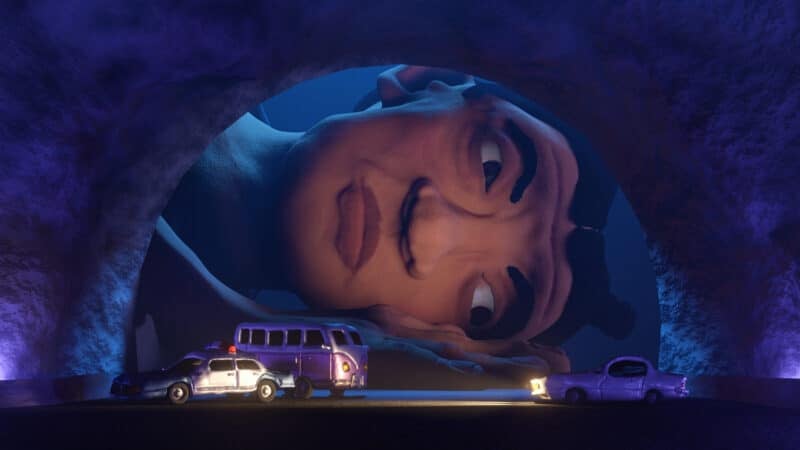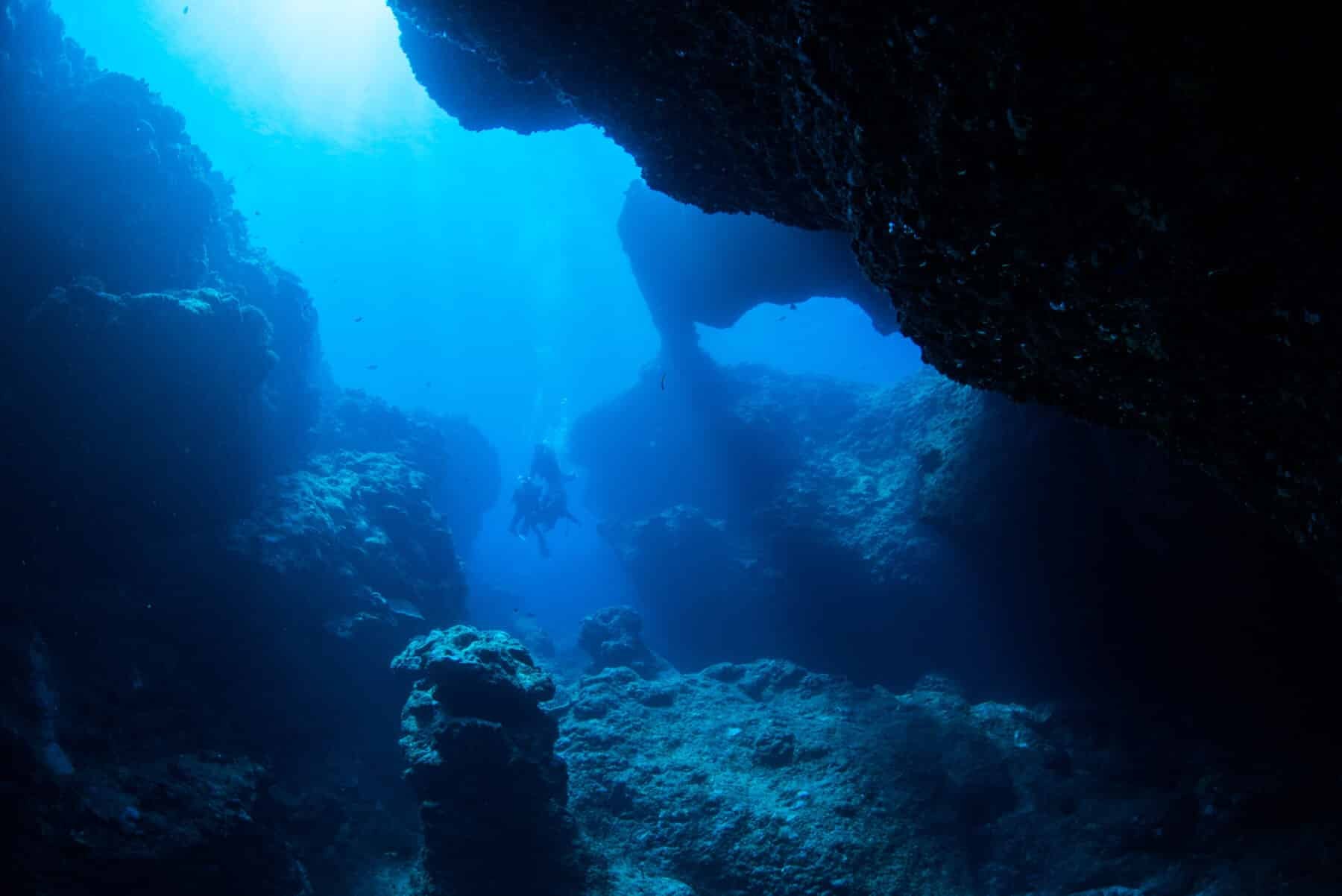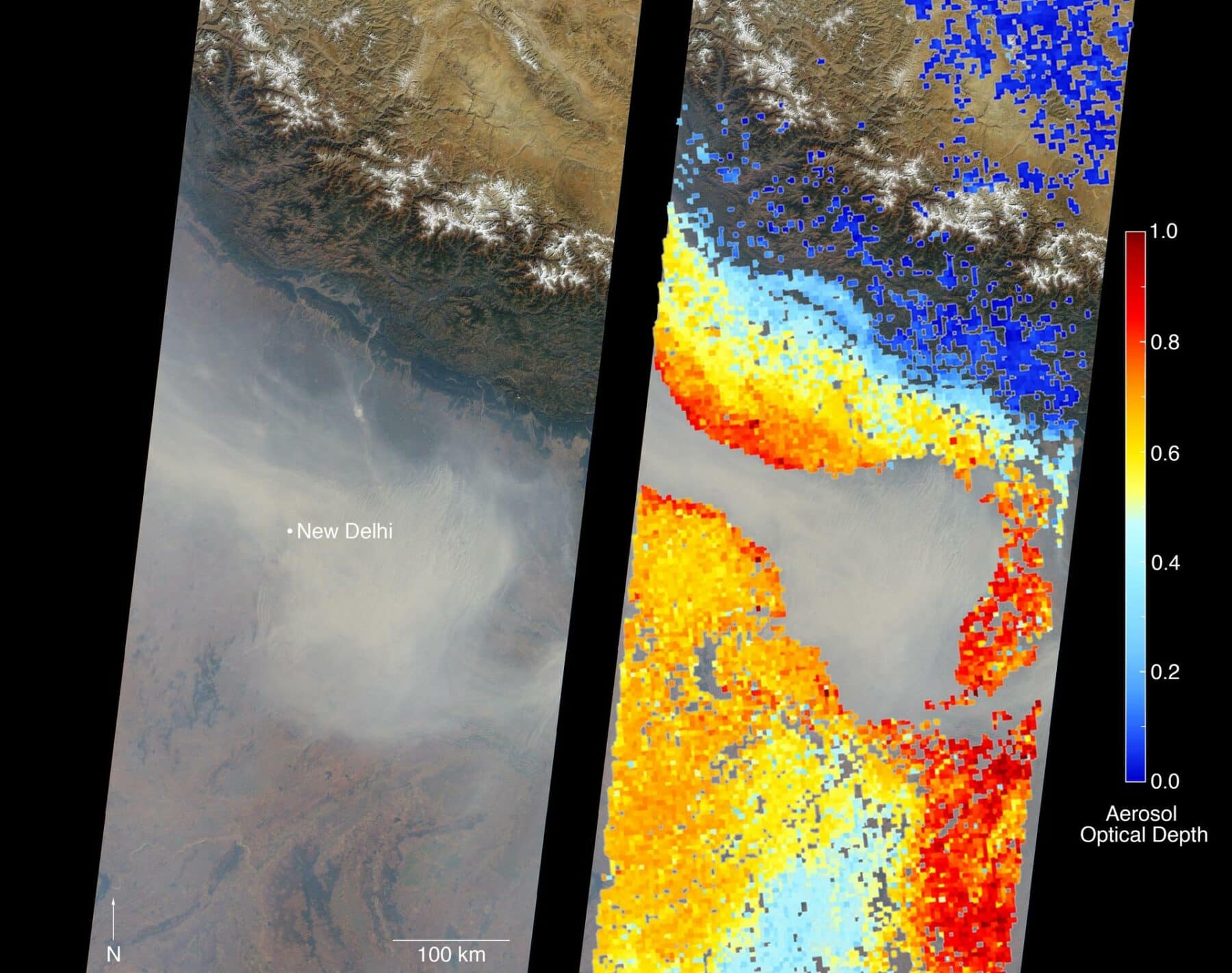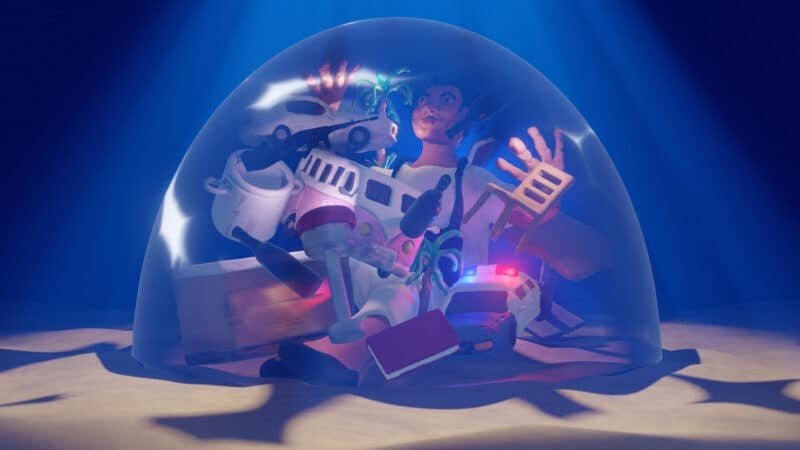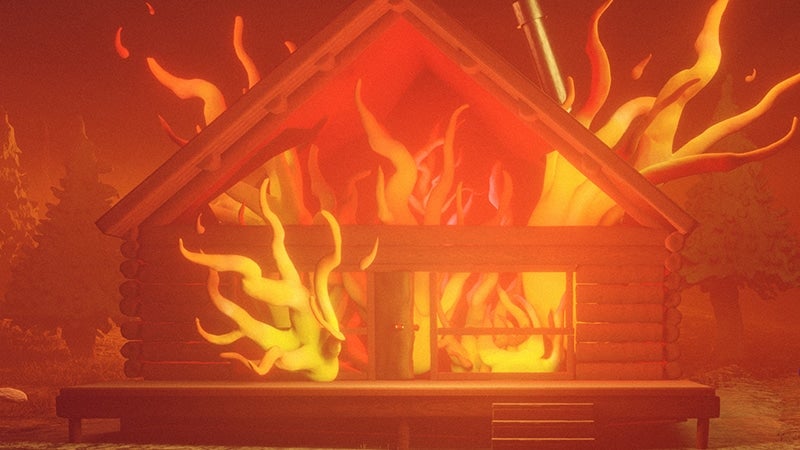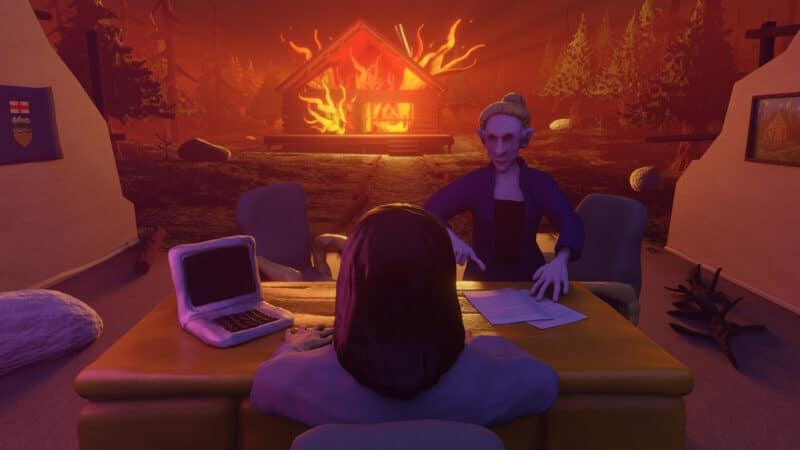Did you know that the seabed in the Arctic Ocean is covered with myriad tunnels? Three hectic highways meet at the foot of the Lomonosov Ridge, uniting the northern parts of the American, Eurasian, and European continents thousands of meters below the surface. But there are numerous other tunnels. They crisscross between the underwater mountains, valleys, and lakes. Here traffic moves leisurely. At the crossroads where the Yukon and East Siberia tunnels intersect at the edge of the steep Chukchi Plateau, you’ll even find a small roadside bar where the weary journeyer may rest for a few hours in artificial daylight. Here, no one cares why you are wayfaring so far off the grid.
Sometimes you’ll hear a distant rumble, maybe from ships far above, maybe from submarines passing. But it could be just your imagination. The walls in the dome stretching over the crossroads are solid, and the enormous fans of the ventilation system that recycle the air emit a loud hum. The surrounding sea is dead, dark, and cold. Yet if you stare long enough through the sea window in the dome wall facing the abyss below the cliff, you could easily believe you’re seeing shadows moving out there, approaching you and the lights of the Chukchi Bar.
Only two vehicles were in the parking lot when Vilde arrived at the bar in the morning: a police car and a battered pink microbus with a broken bumper, both plugged in to solid rechargers. The cars had four wheels, but these were mostly decorative. These days most vehicles managed with fewer, some of the newest models even with transparent ones. The bus, smeared in dust and plastered with colorful stickers from different destinations, would have stood out even on a crowded day. Clearly someone with wanderlust, Vilde mused, and probably fun and free-spirited. At the thought, her mood instantly lifted a notch.
She really needed a boost of positive energy.
Normally the claustrophobia didn’t kick in until after she’d finished her work shift. But for several weeks now it’d been an ever-present force. She woke up sweating from uneasy dreams, and mere trivialities could trigger crippling panic attacks. Usually she managed to ignore the thick dome walls, but now they seemed to constantly press in on her. The thought of the vast ocean outside lodged heavily in her mind.
Usually she managed to ignore the thick dome walls, but now they seemed to constantly press in on her.
It was her own fault—she’d forgotten to stock up on medicine the last time she was on the surface. “Stupid!” she muttered to herself as she opened the door to the bar. “Stupid, stupid, stupid!”
Nico stuck his head out of the kitchen. “Is that you, Vilde?” Then, in a gentler voice, “How’s things?”
She brushed past him into the kitchen. The chef was the only one who’d guessed she was struggling with claustrophobia, but that didn’t mean she wanted it to be a topic between them. Not that claustrophobia was uncommon nowadays, or something to be ashamed of—on the contrary, it was a frequent topic in the news and health advice forums, and most pharmacies had shelves filled with medicines to treat it. But Vilde had never heard about anyone else with severe claustrophobia risking the great depths of the oceans.
“That bad, huh?” Nico murmured, watching her put on her apron with the huge Chukchi Bar logo on it. “So, when are you leaving?”
“Two more days,” she muttered.
Two more shifts and she’d be off for a week. Normally she’d stay put, saving her money. But considering how sick she’d been in the last few weeks, she’d decided to make a dent in her savings and head to the surface for some relaxation at Goliat Spa & Wellness Hotel. Since Natasha, the owner of the bar, had said she would be coming by and thus could give Vilde a lift to the converted oil platform, it’d been an easy decision.
Nico studied Vilde as she stood in front of the mirror and twirled her black hair into numerous tight little knots.
“It’ll do you good.”
He strode over to the stove, where something sputtered in a huge pot. Judging by the delicious aroma, he was cooking his signature dish, his Vegetable Soup the Way Grandma Made It. Vilde suspected there was much irony behind the name. Fresh vegetables were rare, especially down here, and she doubted that anyone had ever tasted anything but dried vegetables. But Nico’s did taste oddly fresh.
“Are you ever going to share your secret?” she asked.
Fresh vegetables were rare, especially down here, and she doubted that anyone had ever tasted anything but dried vegetables.
His green eyes glittered. “Maybe I’ll put it in my memoirs.”
Nico didn’t know she had already discovered his secret—and Vilde was determined to make sure he’d never find out, because then he would know she’d stumbled across it in his personal cabinet. It was an accident, easily explained, but her gut told her he would not approve if she told him she’d seen it: the recipe for his special soup, handwritten in ink. The old-fashioned script had to be his grandmother’s.
Her stomach rumbled loudly, and they both laughed.
“It needs another half hour. I’ll bring you a bowl,” Nico said. “Now off you go to work. Trine is eager to leave, I think.”
She saluted him. “Sure thing!”
The bar wasn’t big compared to the fancy hotel restaurants in the cities, but Vilde had always felt that its low-key interior gave it a friendly atmosphere. People usually stayed for a while, and often they returned, proclaiming it a favorite place. A worn wooden bench stretched along one side of the room. A few tables took up the rest of the space, surrounded by comfortable chairs of different styles and sizes. One wall had windows facing the parking lot. Low music blocked out the ever-present hum outside.
A middle-aged police officer sat on a stool at the end of the bar, tapping notes onto his Thelma. The small screen flared bright on the bar in front of him. From time to time, he stopped writing and mumbled commands to it. “Delete last sentence,” Vilde heard him say, and moments later, “Do a reference check on the second paragraph.” The jacket of his dark blue uniform hung on a peg on the wall next to him. Now and then he glanced at the corner table, his mouth tilting up and down as if he didn’t know whether to laugh or frown.
The noise from that table was raucous but not unpleasant. Three elderly women lounged in deep chairs, chatting in a loud drawl. From New America, she guessed. They sported a rugged grandmotherly style with rough jeans and flannel shirts offset with pink boots and floral cardigans.
Oliver sat on the nearest bar stool reading a thick book. It was no secret the shy cleaning boy dreamed of taking part in the MegaQuiz games. Based on the pile of books next to him, he must have acquired an impressive amount of knowledge, she reflected, wondering as always why the youngster didn’t use his Thelma to read but insisted on ancient paper books.
“Hey, girl!” Trine waved her over to the bar. “The sweet ladies are from New America, methinks. And the policeman is from the Alaska region. He’s been here a good while,” she murmured in Nordic, then switched to English. “The night shift just left. I’m off too. I promised to call Chris before I go to sleep.” She blew a kiss and headed out the door, throwing her apron into the kitchen, where Nico, as usual, would pick it up and put it away in her cabinet.
Amused, Vilde watched Trine cross the parking lot toward the staff house nestled between the two tunnel openings facing the bar. It was a real treat to be able to speak Nordic with her and handy sometimes to have this shared language between them that few of the staff understood. Their great-grandmothers would have struggled with Nordic; schools had only been teaching the new language for less than a century. But as her mother once said, Trine and Vilde would have understood each other anyhow, even if they’d hailed from different places, because most of the original languages were so alike.
She hoped Trine would be able to get through to Chris. They’d had trouble with the connection to the surface for a while now; even their Thelmas were moody. Trine always appeared cheerful and seemed to enjoy her work, but Vilde also knew how much she missed her boyfriend. She guessed that the instant they had enough money to get married and build themselves that underground cave home in the Alaska region, Trine would not hesitate to quit the bar job.
Vilde had always thought of the workforce in the ocean tunnels and platform hotels as a different kettle of fish. They had to be—it took a lot of courage to leave the safety of the cities and work under such harsh and isolated conditions, though Vilde suspected many just hated the thought of crowds.
Most people preferred to live in the megacities, where individual space was limited but amenities were more ample, thanks to the advanced technology and well-developed infrastructure.
Nearly two centuries had passed since humans had given up trying to combat the toxic air that had slowly but surely enveloped the planet—air full of particles that caused serious illness and death, killed livestock and wildlife, and had turned lush forests into lifeless husks. Over time, cities had been reconstructed to shield their inhabitants and house the thousands of refugees arriving from the outer settlements. In the early days, a few smaller above-ground cities had been built under massive domes, but authorities had soon realized these could not accommodate enough people. So most cities were built underground, their numerous streets divided into separate levels, some right below the old cities. As if, Vilde sometimes mused, several cities were stacked on top of each other.
Most cities were built underground, their numerous streets divided into separate levels, some right below the old cities.
Millions of people spent their lives in artificial daylight, never travelling outside their home city’s perimeters. Yet most appeared to be happy, which always puzzled Vilde. Based on their messages and calls, her friends back home in Oslo were content with their busy lives, jobs, and families.
Vilde had asked her mother several times if she wouldn’t like to travel and see the world now that she’d retired. There weren’t many places an old woman with a limited pension could go, but if she saved some of the money Vilde sent, she could enjoy a weekend at a spa hotel now and then. But her mother wasn’t interested. She was happy with her friends and her active social life in the city, and couldn’t understand why Vilde worked at “that horrible place.” “When are you going to come home?” she frequently demanded.
Vilde had never found the courage to tell her mother it was unlikely she would ever move back home. Like Trine, she hated the megacities. She knew she’d always be welcome to stay with Trine and Chris in their Alaskan village. Trine’s boyfriend’s family were outsiders and lived in a village of underground caves far from any city. They produced their own electricity and didn’t seem bothered by the risk of being disconnected from the world.
But the thought of continuing to live underground, whether in Oslo or Alaska, battling claustrophobia for the rest of her life, was depressing.
The possibilities for a life on the surface were limited unless she wanted to wear an oxygen mask almost all the time. And even then, the particles clung to everything—possibly even finding their way behind any protective gear.
So, Vilde didn’t know what she would do or where she would go when she finally left Chukchi Bar. But considering how the claustrophobia had become so much worse lately, she’d need to decide soon.
There was one thing she dreamed of, but it was so far-fetched that she’d never talk about it.
Many years before, she’d overheard someone speaking about an island where you didn’t have to live indoors or underground, where you could breathe real air outdoors and even swim in the sea.
It might be a fairy tale, and she’d never learned to swim, but she thought about the island a lot.
“Hey miss,” one of the old women called.
Vilde walked over, smiling politely. “The chef should have the soup ready any minute now. Are you hungry?”
They all beamed up at her.
“I was just telling Becky here,” one of them said, her lips cherry-blossom pink, “that you have such fun hair.” She gestured at the woman beside her, whose hair was quite fun too, striped with a multitude of pinkish tones. The third woman smiled, her gray curls bobbing when she moved. She patted Vilde’s hand. “I’m Mary. And these rude women are Becky and Anne.”
Becky laughed a little, then gazed up at Vilde. “Those are Bantu knots, aren’t they?” she asked. “I could never manage to do a bun myself. How do you do it? Are you using a fork or a stick?”
“I actually just use my fingers,” Vilde said. “And they’re not buns.” Amused by their curiosity, she sat down and answered their questions.
Nico switched on the daylight system and the lights outside the windows brightened.
It was never pitch dark at the crossroads. Dim light illuminated the place at all times. But for a few hours every day, the people who lived here could boost themselves with extra light to simulate the rhythm of the day.
The old ladies sighed in pleasure.
“Oh, this is nice. I haven’t seen daylight for so long,” Becky said.
It might be a fairy tale, and she’d never learned to swim, but she thought about the island a lot.
“You’ve been on the road for a long time?”
“Oh, yes.”
“Too long,” Anne sighed.
“Yes, we’re heading home soon,” said Mary.
“It’ll be good to see the island again,” Becky murmured.
“The island?” Vilde moved closer, her pulse quickening.
Becky hesitated, obviously noticing Vilde’s eagerness. “Yes, it’s…”
She never finished her sentence because car headlights flashed through the bar’s windows, blinding them. The driver parked right in front of the door, ignoring the marked spots. Vilde thought the long, white car looked perfect for a family but seemed like a strange choice for the two tall men who strode into the bar. One of them, bald and awfully skinny, wore a black leather vest. Swirling tattoos covered his arms. The other man was bald too, though you didn’t notice right away because of his big red mustache. But their eyes were so cold, so indifferent, that you quickly forgot about the rest.
The bar went silent.
The two men sat by the window, their boots high on the table, drinking Chukchi Bar’s homemade liquor, glass after glass. They weren’t interested in Nico’s vegetable soup and sneered as they watched how the three elderly women slurped it up with obvious satisfaction.
Chukchi Bar had seen its fair share of criminals and shady people, but usually those folks stopped only briefly for a quick meal and a glass or two, then left in a hurry as if they thought someone were on their heels. And they might be right about that. Nonetheless, the bar staff welcomed all people on principle, without fussing over which side of the law they might be on.
The bar staff welcomed all people on principle, without fussing over which side of the law they might be on.
The bald men, however, made Vilde nervous. For one thing, they clearly disregarded the police officer, offering only a mock salute in his direction when they entered. For another, they didn’t appear to be in any hurry. But worst of all—and she had a hard time keeping her face expressionless at this—was what they said to each other in low voices, which she understood because they spoke Nordic. What she heard made her stomach sink. It was bad enough that they had no intention of paying before leaving. But they were tunnel robbers, too. Of the most despicable kind. The kind who wouldn’t think twice about killing unlucky motorists before stealing their cars, leaving them in the tunnels where it would be ages before they were found.
Vilde didn’t like the way the men eyed the old ladies, either. “The grandmothers,” as she’d secretly named them, kept up their chirpy chatter, apparently oblivious to the way the two men were sizing them up. Vilde was worried. The fact that the grandmothers owned a vehicle at all was a sure sign that they were wealthier than most, even though the pink bus was old and battered; that they traveled on their own in these remote tunnels was a clear indication that they were either fearless or stupid, or both. Not only was the power required to drive a car enormously expensive, but charging stations were few and far between. They’d be an easy target for tunnel robbers.
Soon the men’s eyes glazed over from all the booze, and Vilde’s face felt like a tight mask. Her insides were a big anxious knot. She sensed a panic attack approaching fast.
When she went to fetch more liquor, she found Nico slouching against the shelves behind the bar, talking calmly with the police officer. Oliver still sat with his book open but wasn’t reading it. Though the three of them were deep in conversation, Vilde was certain they weren’t missing any detail of what was taking place at the window table.
When Nico saw her pale face, he unhitched himself from the wall, cursed, and pushed her gently toward the kitchen.
“Enough. Take a break, Vilde,” he said. “I’ll take care of this.”
Even after she heard the men slamming their car doors and leaving, Vilde struggled to stop the panic attack from erupting, breathing slowly the way she’d taught herself.
She sat on a stool in the kitchen with Nico at her side, a stern look on his face. He held out a glass of filtered water. “Here, take a few sips!”
The police officer entered with Anne right behind him.
“They took off into the Yukon tunnel,” the officer said gruffly. “You okay?”
“She’ll be fine,” Nico said, his voice low.
The officer nodded and Vilde followed his gaze up to Nico’s nose, which looked like it had taken a punch or two. Nico, impressively large, towered over both of them.
From the kitchen, Vilde had heard everything: the shouting, the crashing of furniture thrown to the floor, and the constant flow of Nico’s calm voice.
The officer went back to his Thelma, and Anne strolled around the kitchen, peeking into cabinets and drawers. Normally Nico cast out all customers who tried to enter his kitchen, but weirdly he allowed the old woman to snoop. He was wary though, watching her every movement.
“You have an impressive kitchen, young man,” the old woman said. She pursed her cherry lips. “We do wonder how you managed to cook that fabulous soup—it tasted just like fresh vegetables.”
Nico smiled down at her. “It’s personal … a family secret,” he said, gallantly gesturing for her to leave through the open door.
Anne wagged her finger at him, then laughed.
“Those men sure were nasty,” she said. “As I said to Mary, one wouldn’t like to meet them on a dark night. And all that drinking!” She shook her head and went back to her friends.
Nico turned back to Vilde. “Are you okay?”
Knowing it was best to be active, Vilde gave him a thumbs-up and hopped off the stool.
Life in the bar slowed down again. The old ladies ordered another pot of tea and “some cookies if you have them, dear.” After a while, Becky declared, “Sure is cold in here.” Vilde obligingly fetched a pile of blankets. Their customers always complained about the cold. The Chukchi Bar staff, used to the low temperatures in the dome, barely noticed it.
She listened to the old women’s chatter, envious—they gave the impression of being so free. She wondered again about the island they’d mentioned earlier but had lost the nerve to bring it up again.
After a while, Anne strolled back to the kitchen to talk with Nico again, and soon Vilde heard them both laughing.
“She sure is something, our Anne,” Mary said, smiling fondly. “She’ll probably hang out there now, trying to lure out his cooking secrets.”
“Bet you’re right, Mary,” Becky said, and smiled too.
In the early evening, Nico turned off the daylight boost system and the room darkened. He switched on the lamps inside. The grandmothers, huddled in their blankets, decided to stay a while longer, and the officer didn’t appear to be in any hurry either, so Nico cooked another meal for them.
While they ate, Vilde went outside and stood staring across the parking lot at the gaping tunnel openings. Though the sea window was barely visible in the dim evening light, she thought she saw shadows moving past in the sea outside. She knew her imagination was playing tricks with her mind, because the ocean was dead; nevertheless, she shivered and quickly turned her gaze toward the tunnels again.
A maintenance robot peeped out from the entrance of the East Siberia tunnel, rotated a few meters out, then stood motionless as if noticing her. Then it swung around and spun back into the tunnel.
“Not often you see one here,” the police officer said softly at her side.
She jumped a little—she hadn’t noticed him coming outside.
“They are supposed to last forever,” he said. She strained to hear his words over the steady hum of the ventilation system. “It’s strange how many of them have broken down here in these tunnels. Could be the cold, of course. But I suspect—no, I know—it’s sabotage. Someone is destroying them. I wonder why.”
He turned to Vilde. “Aren’t you folks worried at all? When the robots are not here …” He spread his arms. “The cables could be cut and you’d be out of electricity. Or worse: An unrepaired rift could easily grow and cause the tunnel walls and the dome to burst!”
“An unrepaired rift could easily grow and cause the tunnel walls and the dome to burst!”
Vilde drew in her breath, unsettled. She could feel the claustrophobia awakening.
The police officer noticed how pale she’d become.
“I’m sorry.” He stared at the tunnel openings. “Sabotage. Robbers. It’s so easy to get away with crimes down here. No cameras. Almost no traffic. There are aggressive individuals and then there are the ones you’d never suspect at all, the friendly folks. Seemingly innocent.”
Shaking his head, he went back inside.
Vilde drew in a shallow breath. She wondered what the police officer was doing out here alone in these remote tunnels. Had something happened that he was investigating? Something they hadn’t heard about?
Sometimes it felt like they were wrapped up in an isolated cocoon down here; the surface was so far away. It didn’t help that they often lost their connection to the surface, when their Thelmas became useless. Since most of the staff stayed put on their free time, saving up money, they didn’t know much about what was happening in the world. News from the outside mostly came to them either while chatting with family and friends, if they managed to get a connection, or from travelers.
Something white flashed: the bald men’s car screeched to a stop in front of the bar. The two men stepped out, grinning widely, each holding a big rifle.
“Nico!” she yelled. The men burst ahead of her into the bar.
“You are all dead!” the tattooed guy shouted. He raised his rifle. “We will kill you and then we’ll smash that sea window, drown this place.”
The mustached man laughed, a mad edge to it. He pointed his rifle at the police officer. “You’re first!”
The officer slowly raised his hands.
Vilde stood frozen behind them. She didn’t dare peek at the grandmothers, but she was sure they must be in shock. Trembling, she spoke. “Are you sure you don’t want another glass of liquor?”
The tattooed man stared at her as if he couldn’t believe his ears. He pointed his rifle at her but then, appearing to reconsider, he lowered it, laughing. “Sure, give us something to drink.”
Vilde dashed behind the bar, poured liquor into two glasses and placed them on a tray, her heart hammering. With her back straight and chin up, as if she were in complete control, she carried the tray to the two men. The mustached one lowered his rifle, accepted the drink, examined her over the rim of his glass and said, “You’re coming with us.” Raising his glass in a toast, he downed its contents in one gulp.
The police officer and Anne must have signaled to each other somehow; the officer smashed one of Oliver’s thick books down on the mustached man’s head and kicked him in the back, causing the man to fall and shattering his glass. At the same moment, Anne stormed out of the kitchen and swung a saucepan at the tattooed man’s arm, knocking his rifle to the ground. When he wheeled around to confront his assailant, Nico punched him in the face and the man fell to the floor. The officer and Oliver seized the two rifles and threw them behind the bar, out of reach.
Gunnar, the night shift cleaner, came running into the bar. “What’s happening? Why are there so many police cars here?” he shouted, then halted and took in the scene, his eyes wide. The two bald men lay on the floor, handcuffed. The grandmothers and the staff stood in a circle around them, chatting excitedly and sipping small glasses of liquor.
“Wow,” Gunnar said.
Through the windows they saw that another police car had pulled into the parking lot, roof lights blinking.
“That’ll be my colleagues,” the officer said and walked out to greet them.
The old women exchanged looks.
Nico poured them all another round before corking the bottle and returning it to its shelf. Gunnar left to get ready for work, and Oliver swept up the broken glass. The police had taken off with the bald men, their white car in tow.
Nico looked over at Vilde, who sat staring out the window, and noted the tired shadows under her eyes. “Is everyone all right?” he asked, his voice hoarse.
“Quite an exciting day, wasn’t it?” Mary said, her curls ash-like in the meagre lamp light. She glanced at Vilde too, her forehead creased with worry.
Nico grabbed one of Vilde’s tiny hair knots, tugged it gently, then took the empty glasses out to the kitchen while the grandmothers went back to their table.
Vilde dashed after Nico.
“Why do you think that officer was here in the first place?” she asked.
“Probably on the lookout for those men,” Nico said. “His colleagues must have been close by. How else could they have arrived so quickly? He must have alerted them.”
“The officer told me it’s easy to get away with crimes here because there’s almost no cameras.”
“He’s right about that. I should mention to Natasha when she comes that we should install cameras.”
“The officer told me it’s easy to get away with crimes here because there’s almost no cameras.”
Vilde couldn’t imagine the owner spending more money on the bar than necessary. After all, she owned several others as well. “You really think she would invest in that?”
“I believe I could make her see that it would be a good investment. To protect her property, for one thing. And for the safety of us staff, for another.”
Vilde nodded, but she was still skeptical.
“And if she’s not convinced,” Nico said, “then maybe it’s time I mention that I would like to make her an offer for the bar.”
“What? You’re thinking of buying this place?! You never said.”
“Maybe,” he said. “Nothing to worry about, Vilde,” he added hastily, smiling down at her. “I’m so proud of you, by the way. It took quite a lot of guts to stall the men like you did. And you must have struggled with that fear of yours too.”
“Actually, it never came. I wonder why.”
“That’s good, no?”
It was, Vilde thought. The panic attacks that normally paralyzed her when she felt trapped had not erupted at all. And she’d been in a highly stressful situation. She smiled widely and walked back to the bar.
It was nearly midnight, and the night shift staff was about to arrive when the grandmothers packed up to leave.
“We love to drive during the night, dear,” they assured Vilde when she expressed worry about their safety. Anne went to the kitchen to tell Nico goodbye.
Vilde followed them outside. Becky gazed at her for a moment, then held out a small paper roll. “Here, I want you to have this. You’ve been so kind to us.”
The old woman hugged her and climbed into the pink bus.
Vilde, clutching the small gift, watched them drive away.
Nico came running out.
“Oh no!” He cursed when he saw the pink bus crawling into the East Siberia tunnel.
“What? They forgot something?”
“The opposite. I think they took with them more than they should have.”
“What?”
“I wondered why that woman wanted to be in the kitchen so much. It looks like she stole a few things.”
Vilde gaped at him. “Stole? What things?”
“Some spices and other foodstuffs, which is okay—I can get Natasha to bring more. But I had something hidden in my personal cabinet, an irreplaceable heirloom.”
“The recipe?”
“You knew about it?”
Nico gazed down at her for a moment, then, to her surprise, waved a dismissive hand. “I know it by heart of course, but it was the only thing I had from Grandma.” He sounded sad.
Vilde leaned into him. “I’m sorry.”
He put his arm around her waist.
The bar door opened, and Oliver burst out. “Guys, I think those old ladies stole some of my books!”
Vilde reached out her arm and dragged Oliver toward them, and the three of them stood watching the crossroads. The air system hummed on as if nothing had happened.
“I could go after them,” Nico said after a while. “I think my car is fully charged.”
But he didn’t move.
“You’re not going after them?” Oliver asked, sounding incredulous.
“Nah, what will it solve? They seem harmless. Probably bored. Wanting things that mean something special to other people. Mischievous, maybe even a little bit cruel, when you think about it. The officer told me that things—personal belongings mostly—have gone missing lately at other bars too. I guess that was why he was here.” He smiled ruefully. “I didn’t think to suspect the old folks at all.”
“Do you think he suspected the old women?” Vilde asked.
“Maybe, but the men probably seemed like a more acute situation to handle. I will alert Natasha, though, so she can tell the other bars to pay attention to any old ladies coming their way. And she can decide if she wants to inform the police about them.”
Oliver opened his mouth, then shut it and walked inside the bar, his shoulders hunched.
Vilde and Nico stood watching their night-shift colleagues walking toward them from the staff house. Trine waved.
Vilde felt calm for the first time in many days. It had been close, but she’d miraculously escaped without any panic attacks erupting. Now, as she stood with Nico, tired from a day’s work, she couldn’t feel any hint of the usual press of claustrophobia on her lungs. The dome walls around the crossroads looked like they normally did, not as if they were moving closer. She should feel a panic attack coming on—they were, after all, thousands of meters below the Arctic Ocean’s surface. But curiously, the claustrophobia was absent. For the first time in a long while, Vilde felt free. She could breathe again.
She sighed, content. Hopefully she would be able to get some sleep. One more shift and she’d go to the surface.
Nico squeezed her shoulder. “Some day, huh?”
She looked down at the unexpected gift from Becky. It looked like a page torn out of a book. Perhaps the one they’d taken from Oliver. A name was written on the sheet.
She just knew it was the name of the island.
“Oh, yes. Some day.”
